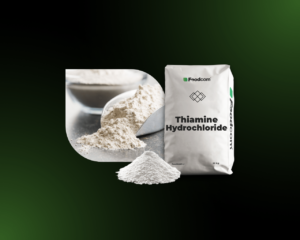- Changes in the classification of chemicals are aimed at increasing user safety and protecting the environment.
- Logistical problems and rising raw material costs are leading to significant increases in glycerine prices.
- The EU has banned helium imports from Russia, affecting the global market, increasing Qatar’s importance as a supplier.
- An explosion at Milford Proving Ground caused damage, but fortunately no injuries were reported.
In our latest newsletter, we outline the key developments in the chemicals market for November 2024. We discuss the new EU legislation on chemical classification, the dynamic rise in citric acid prices and the stabilisation of vitamin C prices. We also cover rising glycerine prices, the impact of Russia’s helium import ban on the market and recent events such as the explosion at General Motors Milford Proving Ground.
Take a look at the latest trends that are shaping the chemical industry!
Citric acid (mono and anhydrous)
Prices for citric acid, both monohydrate (mono) and anhydrous, have risen sharply this autumn. The main reason for this is reduced supply due to production constraints in China, a key global supplier. Rising raw material prices and energy costs have also contributed to the price of this popular additive. Increased demand for citric acid, used as an important acidity regulator in the food and pharmaceutical industries in Europe, is keeping pressure on availability. Forecasts suggest that prices will continue to rise until at least the end of the year.
Vitamin C (L-ascorbic acid)
Vitamin C prices, after dynamic increases at the beginning of autumn, are now tending to stabilise. This is due to an improvement in the production situation and the resumption of full capacity at key factories in China. Supply and demand remain in balance, but there is uncertainty about the future, due to potential fluctuations in raw material costs and the possibility of new health regulations. Increased demand in the dietary supplements and food sectors may keep prices at their current higher levels.
Vesmody U300E
Vesmody U300E, a urethane rheology modifier used in aqueous coatings, is seeing stable demand, especially in the European market, where there is an increasing demand for high-performance products for paints and varnishes. Thanks to Unicap technology, the product features excellent water and alkali resistance, making it an attractive choice for paint manufacturers in regions with high humidity. Challenges in logistics and raw material availability are currently evident in the market, which could affect delivery times to customers and cause price fluctuations in the coming months.
PSG (potassium sorbate granulate)
Potassium sorbate granulate (PSG), used as a preservative in the food industry, maintains stable prices, although slight fluctuations are possible due to the situation in the global agricultural raw material market. Increased food production in developed countries and growing pressure to extend the shelf life of products are keeping demand for PSG high. Currently, the balance between demand and supply is stable, but rising energy costs may cause a slight increase in prices in the long term.
NEWS
on 20 November 2024, the new EU Parliament and Council Regulation 2024/2865 was published, introducing changes to the classification, labelling and packaging of chemicals. The new rules aim to increase user safety and better protect the environment, simplifying the rules for producers and consumers. The new rules aim to increase the safety of users of chemicals and better protect the environment, introducing clearer rules for producers and consumers.
In November 2024, the global glycerine market experienced a significant price increase. A sharp increase in raw material costs and supply constraints due to logistical problems contributed to this situation. The increase in glycerine prices was particularly felt in the cosmetics and pharmaceutical sectors, which use glycerine as a key ingredient. The chemical industry expects that prices may remain elevated in the coming months, which poses challenges for manufacturers of finished products.
The European Union has banned the import of helium from Russia from 26 September 2024, raising concerns about Europe’s future helium supply. Although Russia has not been a major supplier of helium, the ban could affect the global market. Qatar, as one of the largest helium producers, has the opportunity to fill the gap with its developed infrastructure and efficient export channels. Demand for helium is growing, especially due to the growth of the semiconductor industry and AI and 5G technologies, which could lead to further price increases and problems with raw material availability.
on 27 November 2024 , a tank containing oil drilling by-products explodednear the General Motors Milford Proving Ground in Brighton, Michigan. The explosion damaged two nearby homes, but no injuries were reported. The fire was quickly brought under control by local emergency services. The causes of the incident are currently under investigation.

![What’s new in the chemical industry? Market overview and analysis [November 2024] What’s new in the chemical industry? Market overview and analysis [November 2024]](https://foodcom.pl/wp-content/uploads/2024/11/biuletyn-industrialny-1520x760.png)


![What’s up? Feed industry news from Foodcom S.A. [October 2024] What’s up? Feed industry news from Foodcom S.A. [October 2024]](https://foodcom.pl/wp-content/uploads/2024/10/feed-biuletyn-600x300.png)
![Chinese New Year challenges MSM and soy protein isolate supply [64th Edition of ADDITIVES Newsletter] Chinese New Year challenges MSM and soy protein isolate supply [64th Edition of ADDITIVES Newsletter]](https://foodcom.pl/wp-content/uploads/2023/08/Foodcom_SA_Newsletter_Additives-600x300.jpg)
![Chemical industry news from Foodcom S.A. [October 2024] Chemical industry news from Foodcom S.A. [October 2024]](https://foodcom.pl/wp-content/uploads/2024/09/industrial-biuletyn-600x300.png)

